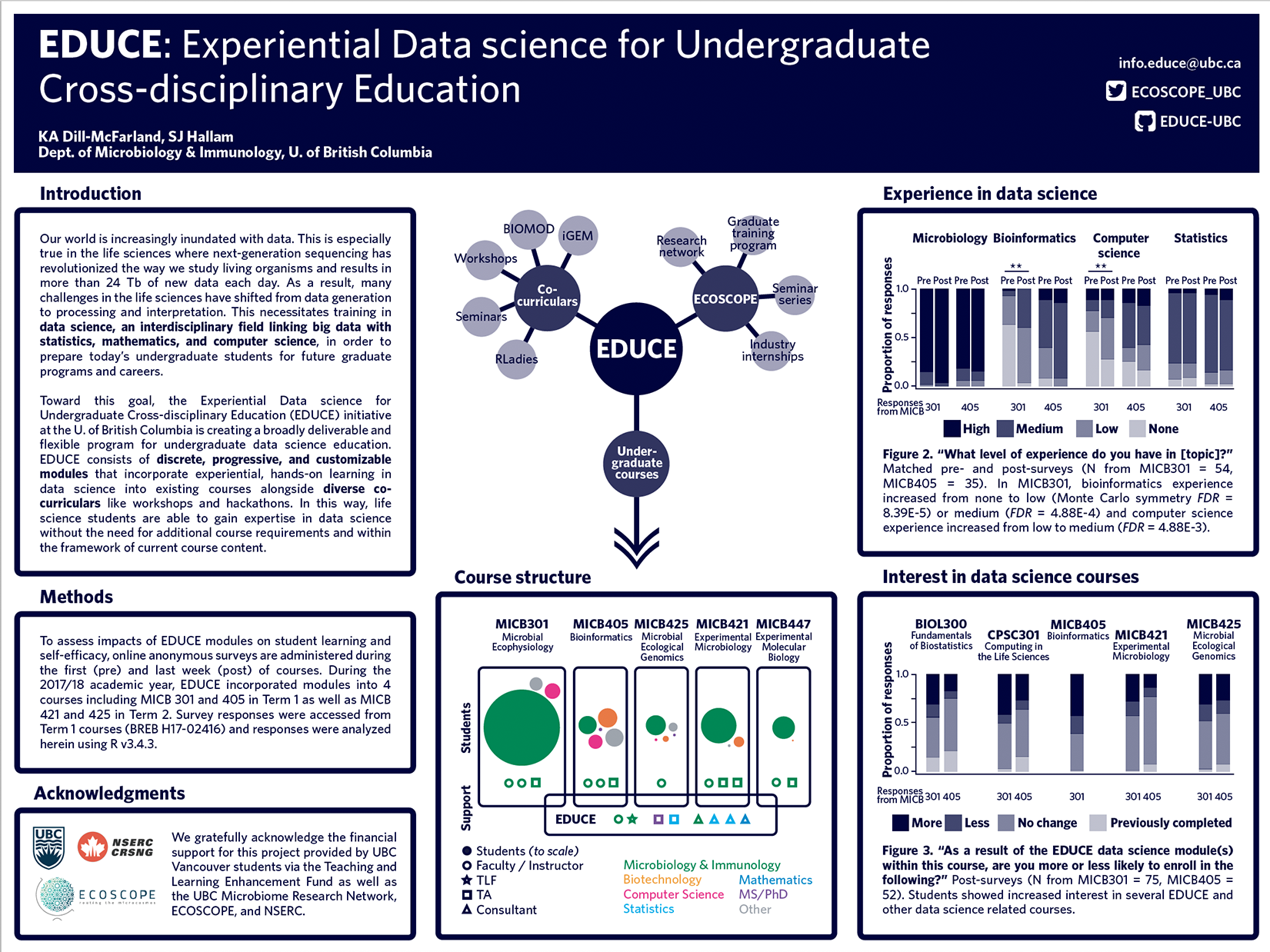| Title | Experiential Data science for Undergraduate Cross-Disciplinary Education (EDUCE) |
|---|---|
| Faculty/College/Unit | Science |
| Status | Completed |
| Duration | 3 Years |
| Initiation | 04/01/2017 |
| Completion | 03/01/2022 |
| Funding Details | |
| Year 1: Project Year | Year 1 |
| Year 1: Funding Year | 2017/2018 |
| Year 1: Project Type | Large TLEF |
| Year 1: Principal Investigator | Steven Hallam |
| Year 1: Funded Amount | 81,833 |
| Year 1: Team Members | Steven Hallam, Associate Professor, Microbiology and Immunology, Faculty of Science / Director, ECOSCOPE NSERC CREATE Training Program / Canada Research Chair in Environmental Genomics / CIFAR Scholar |
| Year 1: Summary | EDUCE seeks to develop a uniform experiential learning framework that is cross-disciplinary and collaborative to equip undergraduate students in the life sciences with basic competency and literacy in data science as it pertains to microbiome sequence information. To achieve this, EDUCE will develop and implement a mechanism to augment undergraduate training in the Department of Microbiology and Immunology (MICB) with basic analyses and statistical principles and microbiome data processing and interpretation – skills that transcend any one course in the department. In phase one, EDUCE will integrate new data science modules into existing third and fourth year courses and offer experiential learning activities including open office hours, social problem solving activities and workshops. Through this combination of integrated course modules and experiential learning activities EDUCE will provide persistent benefits to undergraduate students to better prepare them to address complex social, environmental, and technological challenges in an increasingly collaborative and data-driven workforce. |
| Year 1: TLEF Showcase |  |
| Year 2: Project Year | Year 2 |
| Year 2: Funding Year | 2019/2020 |
| Year 2: Project Type | Large TLEF |
| Year 2: Principal Investigator | Steven Hallam |
| Year 2: Funded Amount | 85,698 |
| Year 2: Team Members | Steven Hallam, Associate Professor, Microbiology and Immunology, Faculty of Science / Director, ECOSCOPE NSERC CREATE Training Program / Canada Research Chair in Environmental Genomics / CIFAR Scholar |
| Year 2: Summary | EDUCE seeks to develop a uniform, cross-disciplinary, and collaborative framework to equip undergraduate students in the life sciences with basic competency in data science. To achieve this, EDUCE implements modules in data science tools, statistical principles, and microbiome data analyses across third and fourth year Microbiology and Immunology (MICB) courses as well as synergized co-curricular activities. In the next year, EDUCE will continue to refine data science modules, calibrate co-curricular activities, and assess student learning outcomes in order to develop a rigorous, data-driven framework for data science education in the life sciences. Moreover, EDUCE will work with the Faculty of Science Data Science Curriculum Committee to integrate this model within the larger Faculty of Science community of practice. Thus, EDUCE will provide persistent benefits to undergraduate students to better prepare them to address complex social, environmental, and technological challenges in an increasingly collaborative and data-driven workforce. |
| Year 3: Project Year | Year 3 |
| Year 3: Funding Year | 2020/2021 |
| Year 3: Project Type | Large TLEF |
| Year 3: Principal Investigator | Steven Hallam |
| Year 3: Funded Amount | 81,833 |
| Year 3: Team Members | Steven Hallam, Associate Professor, Microbiology and Immunology, Faculty of Science / Director, ECOSCOPE NSERC CREATE Training Program / Canada Research Chair in Environmental Genomics / CIFAR Scholar |
| Year 3: Summary | In the next year, EDUCE will continue to refine data science modules, calibrate co- curricular activities, and assess student learning outcomes in order to develop a rigorous, data-driven framework for data science education in the life sciences. Moreover, EDUCE will work with the Faculty of Science Data Science Curriculum Committee to integrate this model within the larger Faculty of Science community of practice. Thus, EDUCE will provide persistent benefits to undergraduate students to better prepare them to address complex social, environmental, and technological challenges in an increasingly collaborative and data-driven workforce. |
| Project Report | 2020‑TLEF‑Final-Report‑Hallam-WEB.pdf |